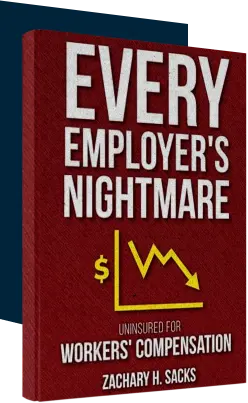Rejected Claims Can Be Escalated By Employees
The Workers’ Compensation Appeals Board (WCAB) handles the process for workers’ compensation claims. When an employee’s claim is rejected by their employer, they may take their case to the WCAB in the hopes of having the Board declare their claim to be valid and compel the employer to offer workers’ compensation to the injured employee. The Board takes into evidence, and if it determines that an employer was liable for the injuries the employee sustained, the employer may then need to provide benefits to the employee. In short, an employee has little to lose by filing a claim with the WCAB—it is simply a matter of waiting to see if their gamble pays off. For the employer, on the other hand, the lawsuit can end up being costly.
Time And Resources May Be Drained By The Process
Building your case against the claim takes time and effort, as well as investing time in researching and investigating the circumstances surrounding the employee’s alleged injury. The process can also mean cashing out of your pocket as you sacrifice part of your workday to attend the trial and argue your side of the issue. These drains on time and resources can be costly for the employer, and if the WCAB finds in favor of the employee, those costs could end up being all for nothing.
Long Beach Workers’ Compensation Lawsuits: Valid Reasons to Deny Workers’ Compensation Claims
When applied properly, California’s workers’ compensation system benefits both employees and employers. For employees, it provides a consistent and fair means of seeking financial compensation for losses resulting from a workplace accident or illness. For employers, it ensures that employees can’t be held directly accountable for on-the-job accidents by suing them.
However, across virtually all industries, there may be workers who attempt to take advantage of the system. You could pay the rising insurance premium costs if this happens at your company.
It’s important to be confident when rejecting a workers’ compensation claim. You want to know that your employees are receiving the benefits for which they’re eligible when they have valid reasons to seek said benefits. That said, there may be instances when you have legitimate reasons to deny workers’ compensation claims. The following are common examples:
You Have Strong Reason to Believe An Accident Wasn’t Work-Related
It’s not uncommon for those committing workers’ compensation fraud in Long Beach to genuinely be injured. They’re simply not entitled to workers’ compensation benefits because they actually sustained their injuries outside of work.
Be aware that, depending on the circumstances, an employee could technically be on the premises of their workplace without necessarily being on the clock when an accident occurs. Even if an employee was physically at or near the location where they work, they might not be eligible to receive workers’ compensation benefits if they were not operating within the scope of their employment when they were injured.
Signs that an employee may be claiming they were injured at work when they were actually injured elsewhere or while off the clock include:
- Inconsistent stories.
- Lack of witnesses or testimony from witnesses that conflicts with an employee’s story.
- Surveillance/security camera footage that conflicts with an employee’s story.
An Employee Was Intoxicated
An employee doesn’t need to prove they were injured as a result of negligence to demonstrate that they’re eligible to receive workers’ compensation benefits. They only need to show that they were operating as an employee when they were injured to indicate that their workers’ compensation claim should be honored.
However, sometimes, employees are injured at work due to their own unreasonable negligence. This can happen if an employee was injured because they were intoxicated. If an employee caused their own injuries because they were under the influence of drugs or alcohol, they don’t deserve to receive workers’ compensation benefits.
An Employee Was Engaging in Horseplay
Employees are expected to behave responsibly at work. An employee could negligently cause their own injuries if they were to engage in unreasonable horseplay in a work environment.
That said, it can sometimes be challenging to prove that an employee’s behavior qualifies as horseplay. This is one of many reasons to hire an attorney specializing in Long Beach workers’ compensation lawsuits if an employee disputes your reason for denying their claim. Our experts can help you provide evidence showing you were justified in denying an employee the workers’ compensation benefits they were seeking.
Your Business Deserves A Good Representative At Trial
You do not want to attend the WCAB trial alone. It is crucial that employers seek out qualified legal counsel to represent them during a workers’ compensation lawsuit. Our attorneys have lengthy experience in practicing workers’ compensation defense law, and we have a long history of getting satisfying results for our clients, including corporations and small businesses. We can investigate the claim on your behalf, attend the trial, and argue in favor of your business’s best interests.
We Can Represent Employers Facing Workers’ Compensation Lawsuits
If your employee has filed a claim against you and you need a workers’ compensation lawsuit defense attorney in Long Beach, the expert attorneys at Sacks Law Group, APC, are here to assist you. The trial process can be time- and resource-consuming for employers, and they have a host of other matters that require their attention on any given day. That is why hiring a skilled and experienced attorney to guide you through—and represent you during—the process is crucial. Contact us today for your consultation.
Uninsured
Employers
Providing expert defense against fraudulent and frivolous workers’ compensation claims.
Insurance Carriers &
Self Insured Employers
Providing comprehensive workers’ compensation defense to insured and self-insured Employers.

We defend uninsured employers.
We wrote the book on it.
Available on Amazon & Booksellers
READ THE REVIEWSEmployers Workers' Compensation Defense
The workers’ compensation defense attorneys at our firm know how to build a strong wall of defense around employers, protecting California employers from frivolous and fraudulent workers’ compensation claims. Sacks Law Group, APC, is skilled at working with in-state and out-of-state employers on all workers’ compensation defense issues, particularly in the areas of:
Prior to any alleged injury or accident, we also counsel employers on ways to stay compliant with the ever-evolving California workers’ compensation laws. California employers benefit from our extensive experience and strong credentials when dealing with employee workers’ compensation fraud, as well as allegations of employer workers’ compensation fraud.
